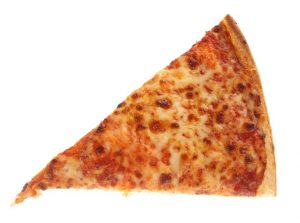Power Niche Marketing: The First Power Niche Marketing Lesson
What can lawyers learn from pizza purveyors? Managing partner Bruce Stachenfeld explains.
 Let me start this article with a short story, which I read in the New York Times about five years ago. It was about two warring pizza parlors. They were almost next door to each other in New York City and as far as I know they were both doing very well. I think they were each selling pizza slices for over $1.50 per slice. In New York at that time that apparently was a perfectly satisfactory price, which gave the seller a reasonable profit, and customers were quite willing to pay that price. All was well with the world.
Let me start this article with a short story, which I read in the New York Times about five years ago. It was about two warring pizza parlors. They were almost next door to each other in New York City and as far as I know they were both doing very well. I think they were each selling pizza slices for over $1.50 per slice. In New York at that time that apparently was a perfectly satisfactory price, which gave the seller a reasonable profit, and customers were quite willing to pay that price. All was well with the world.
Then one day, one of the pizza parlors lowered its price to $1!!!
The other one matched this lower price and then, in perhaps a fit of pique, lowered his price to $.75.

Data Privacy And Security With Gen AI Models
The price war quickly resulted in the price almost dropping further to $.50, which is apparently break-even. This meant that neither pizza parlor was making anything at all. They were working for free. Their customers were getting all the upside of the pizza.
I don’t know how it ultimately ended, but one of the owners was defiantly quoted in the article as saying that if the other guy dropped his price further he would go even lower.
It was a sad and foolish story that resulted in a race to the bottom and, if it continued further, would logically have resulted in the bankruptcy of both pizza purveyors.
Well, when I teach marketing to my young lawyers, I tell them very simply: We don’t ever ever ever want to be like those pizza guys. That is the first lesson.
Sponsored

Curbing Client And Talent Loss With Productivity Tech

Legal Contract Review in Under 10 Minutes? Here’s How

Data Privacy And Security With Gen AI Models

Legal Contract Review in Under 10 Minutes? Here’s How
Ultimately, if you are selling the same thing as someone else, then you are in a very weak position. You have to rely on being likable or other clever strategies to market commodities, which really consist of trying to convince the customer your product really isn’t the same, or tying your “same” product to “non-same” services. Otherwise your customer has an easy ability to just say that the other guy is cheaper than you and you have no choice but to match the price, and away goes your profit. If you are reading carefully here, the (ironic) point is that if your product is the same as everyone else’s, the goal is to make it appear that it is not really the same.
So now we come to a very important insight about Power Niche marketing, so please read carefully here, as this is critical.
The concept of marketing in a niche is counterintuitive but very powerful. It means that instead of trying to be “all things to all people,” you instead pick a smaller subset of whatever industry you are in and learn every single thing possible about that smaller subset and dominate it. Basically instead of a small fish in a big pond, you become a small fish in a smaller pond, but since the smaller pond is so much smaller, you now look like a big fish!
Let’s go back to our poor pizza players and illustrate what I would have done in that situation. Let’s say that one of the guys had recognized that he was of Indian background (which was true based on the article). What if he decided to market Indian Pizza, which would be pizza that had interesting Indian toppings on it. Instinctively, this sounds like a losing strategy to many since you would be kind of giving up all the customers who like regular old pizza. So you might say instinctively that this is not a good idea.
However, the key fact that makes the Power Niche work so well is that you don’t need every customer to want you. You just need a tiny little bit of the market to want you in the worst way.
Sponsored

Tackling Deposition Anxiety: How AI Is Changing The Way Lawyers Do Depositions

How Thomson Reuters Supercharged CoCounsel With Gen AI Advances

Please keep the foregoing thought not just for a minute but for the rest of your life. If you get nothing else out of my articles, this thought alone is of incredible value.
When someone tells you that they want to start a business and only one percent of a ten billion dollar market will make the product a success, your first question should be, how will she stand out in that market? How will she be different? If there is no answer to that question, then she will either completely fail or, if by some lucky break she succeeds, she will not make any profit from her success.
To continue here, a Power Niche for the pizza seller of Indian background could have been Dalal’s Indian Pizza Kitchen, “which creates mouth-watering Indian dishes fused with American pizza. After you have tried this incredible cuisine just once, you will never want plain old pizza again!”
This would have transformed this pizza seller from a pathetic player dropping his price lower and lower to beg any customer to come in, into someone with ownership of a very narrow niche that appealed to a much smaller subset of customers. How much could he have charged for a pizza slice in the center of New York City? $3.00? $4.00? $5.00? Or maybe $11.00 for the Tandoori Chicken Pizza Supreme?
Would this have worked? Of course I don’t know that without trying — and part of marketing is trying new ideas and failing with some and succeeding with others; however, one thing is crystal clear, and that is that the Dalal’s Indian Pizza Kitchen idea has a greater chance of success than does selling plain old pizza next to someone else perceived to be doing the same thing.
Did you note that here I am proposing to innovate, as well as market? And did you note that I am “creating” customers too – since I am suggesting a new cuisine that customers didn’t really know they wanted until they tried it?
This would be a perfect example of a Power Niche in action, since by being the “only” Indian Pizza purveyor he would have ultimate bargaining power over a very small subset of customers who would learn that this is the pizza they really want. So instead of being in a weak spot with no bargaining power, our pizza purveyor would now be sought after eagerly.
If you are smart, you will realize that this monopoly bargaining power position lasts only as long as no one else also decides to sell Indian Pizza. I will talk about this later, which is the fact that it is rare that a Power Niche will last forever.
The bottom line is that if you are just a salesperson selling a commodity and begging your customers, employees, bosses, and everyone around you, just to talk to you, buy your product, keep your job, etc., it is kind of a pathetic existence.
However, if you can truly build, develop and “own” a “Power Niche” you become someone who everyone wants to do business with inside your niche. In that niche, instead of you begging others to do business with you, they are genuinely interested in what you have to offer and hopefully begging you for your product or service and, of greatest importance, willing to pay top dollar for it.
 Bruce Stachenfeld is the managing partner of Duval & Stachenfeld LLP, an approximately 70-lawyer law firm based in midtown Manhattan. The firm is known as “The Pure Play in Real Estate Law” because all of its practice areas are focused around real estate. With more than 50 full-time real estate lawyers, the firm is one of the largest real estate law practices in New York City. You can contact Bruce by email at [email protected]. Bruce also writes The Real Estate Philosopher™, which contains applications of Bruce’s eclectic, insightful, and outside-the-box thinking to the real estate world. If you would like to read previous articles or subscribe, please click here.
Bruce Stachenfeld is the managing partner of Duval & Stachenfeld LLP, an approximately 70-lawyer law firm based in midtown Manhattan. The firm is known as “The Pure Play in Real Estate Law” because all of its practice areas are focused around real estate. With more than 50 full-time real estate lawyers, the firm is one of the largest real estate law practices in New York City. You can contact Bruce by email at [email protected]. Bruce also writes The Real Estate Philosopher™, which contains applications of Bruce’s eclectic, insightful, and outside-the-box thinking to the real estate world. If you would like to read previous articles or subscribe, please click here.







